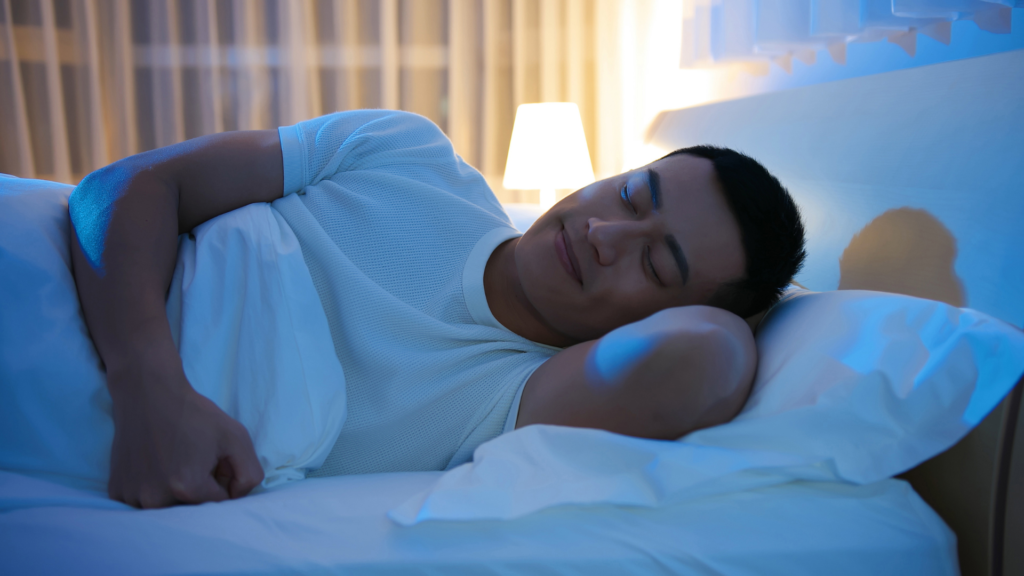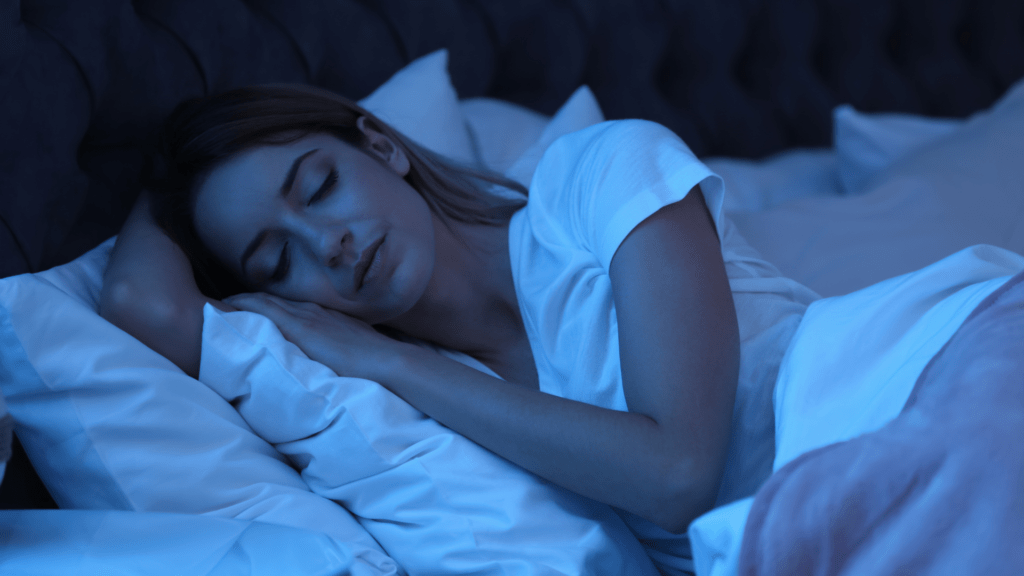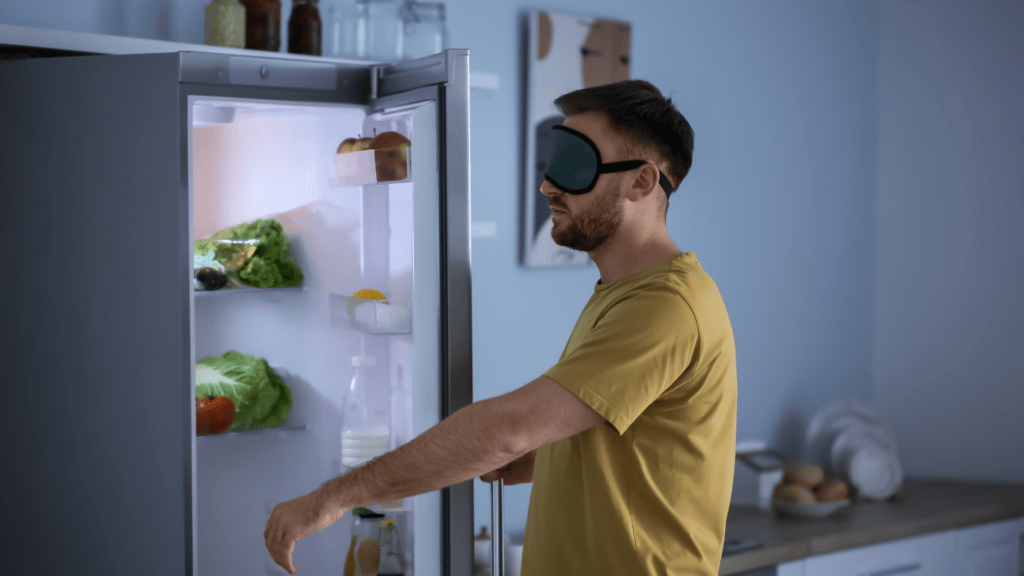When it comes to talking in your sleep, many people think it’s a sign of something serious or that it reveals hidden thoughts. You may have heard that sleep talking means you’re sharing secrets, or it’s your brain trying to process emotions. While these theories can sound intriguing, they aren’t entirely true. Sleep talking, or somniloquy is usually harmless and doesn’t necessarily reflect what’s happening in your waking life. Most of the time, it’s a common occurrence and not a sign of anything alarming.

What Does It Mean When You Talk in Your Sleep?
So, what does it mean when someone is talking in their sleep? Simply put, sleep talking is a form of parasomnia, a type of sleep disorder that leads to unusual behavior during sleep. When people talk during sleep, it can range from simple mumbling to full conversations. It’s fascinating, but often not something to worry about. It happens because the brain is in a semi-awake state, even though your body is still asleep.
One important thing to remember is that sleep talking isn’t usually a reflection of deep, emotional problems. Instead, it could be triggered by everyday factors like stress, anxiety, lack of sleep, or even certain medications. While it can seem strange or funny to witness, most of the time, talking in your sleep doesn’t require any treatment.
The Science Behind Sleep Talking: What Causes Sleep Talking in Adults?
Understanding the science behind sleep talking starts with recognizing how sleep works. We all cycle through different stages of sleep throughout the night, including REM sleep (Rapid Eye Movement) and non-REM sleep. Sleep talking can happen during both stages, but it’s more common during non-REM sleep. This is when the body is in a deeper, more restful state.
So, what exactly causes sleep-talking in adults? There are a few potential triggers:
Stress and Anxiety
High levels of stress or anxiety can lead to restless sleep and increase the chances of talking in sleep. If your mind is racing before bed, it could carry over into your sleep, leading to vocal expressions.
Lack of Sleep
Being overtired can also make sleep talking more likely. When your body doesn’t get enough rest, the quality of your sleep declines, increasing the likelihood of parasomnia episodes like sleep talking.
Medications or Substances
Certain medications, especially those related to mental health, can affect how deeply you sleep. Alcohol or other sedatives may also interfere with normal sleep patterns and result in talking while sleeping.
Sleep Disorders
People with other sleep disorders, like sleep apnea or night terrors, are often more likely to talk in their sleep. Sleep disruptions can trigger parasomnias, leading to unusual behaviors like dream talking.

Sleep talking in adults may happen more frequently when you are exhausted, stressed, or experiencing other sleep-related disorders. While these factors play a role, it’s important to know that the occasional bout of sleep talking is usually harmless.
Stages of Sleep and Sleep Talking: The Connection
To fully understand what makes people talk in their sleep, we need to dive into the stages of sleep. As mentioned earlier, sleep occurs in cycles. Each cycle has various stages: light sleep, deep sleep, and REM sleep.
Non-REM Sleep
Sleep talking most often occurs during non-REM sleep, especially in the lighter stages when you’re not fully unconscious but also not awake. The brain is less active in this stage, but certain parts may still fire signals, which can result in talking during sleep.
REM Sleep
Some sleep talking also occurs during REM sleep, which is the stage where dreaming happens. While your body is typically paralyzed during REM sleep to prevent you from acting out your dreams, your vocal cords may still function, leading to dream talking.
The fact that sleep talking can happen in both REM and non-REM stages shows how complex our brains are during sleep. Different parts of the brain are active at different times, and this can cause speaking in sleep without you being aware of it.
Is Sleep Talking Related to Other Sleep Disorders?
Sleeping doesn’t happen in isolation. It’s often linked to other sleep disorders, especially those under the umbrella of parasomnia. Parasomnias are disruptive sleep-related events, and sleep talking is one of the milder forms. More severe parasomnias, like sleepwalking or night terrors, can also involve talking at night or even shouting.
If you notice that your sleep talking is happening frequently, or if it’s accompanied by behaviors like thrashing, walking, or acting out dreams, it could be a sign of a more serious parasomnia. Conditions like sleep arousal disorders or sleep apnea can disrupt your sleep patterns and lead to talking while sleeping. It’s worth paying attention to how often it happens and whether it interferes with your sleep quality.
Narcolepsy and Sleep Talking: How They’re Linked
In some cases, sleep talking could be linked to a condition that causes extreme daytime drowsiness and sudden episodes of sleep. While this condition is different from other sleep disturbances, it can sometimes lead to talking in your sleep due to disruptions in normal sleep cycles. Understanding these connections can provide valuable insights into the nature of sleep behaviors and the various factors that influence them.
Understanding Sleep Talking: Common, Harmless, and Often Triggered by Everyday Factors
Sleep talking, while mysterious and sometimes entertaining, is a common and typically harmless phenomenon. It occurs in many individuals and is often triggered by everyday factors like stress, lack of rest, or minor sleep disturbances. Understanding the underlying mechanisms of this behavior helps put it into perspective and shows that it’s just another part of the intricate world of sleep. So, if you or someone you know experiences this, there’s usually no need to worry—unless it happens frequently or alongside other disruptive behaviors.
In the next section, we’ll dive deeper into parasomnia and other sleep disorders, exploring their definitions, symptoms, and how they relate to sleep talking. Stay tuned to find out more about these sleep-related phenomena and how to manage them effectively!
How to Avoid Talking in Your Sleep: Debunking the Myth
Many people think that talking in your sleep is inevitable and that there’s nothing you can do to stop it. This common belief is simply not true. While it may seem random, there are effective ways to prevent this behavior by making simple lifestyle adjustments and understanding the triggers. You’re not stuck with it forever; with the right strategies, you can significantly reduce or even eliminate it. By focusing on better sleep hygiene and managing stress, you can create a more restful environment that minimizes these occurrences.
Simple Steps to Avoid Talking During Sleep
Avoiding talking during sleep often comes down to managing the factors that contribute to it in the first place. Since it is commonly linked to stress, anxiety, and poor sleep hygiene, the goal is to create a sleep-friendly environment and practice habits that promote restful, undisturbed sleep.
Here are some practical tips to avoid sleep talking:
Improve Sleep Hygiene
Make sure you’re sticking to a consistent sleep schedule. Going to bed and waking up at the same time every day helps regulate your body’s internal clock, reducing disruptions during the night. Avoid heavy meals, alcohol, and caffeine before bedtime since they can interfere with your sleep and trigger sleep-talking.

Manage Stress and Anxiety
Stress is one of the biggest contributors to talking in your sleep. Practice relaxation techniques like meditation, deep breathing, or journaling before bed. Calming your mind can prevent overactivity during sleep and reduce the likelihood of talking at night.
Create a Comfortable Sleep Environment
Your bedroom should be a peaceful, quiet space designed for sleep. Keep it dark, quiet, and cool. Investing in a good mattress and pillow can also make a big difference in improving sleep quality and reducing nighttime disruptions like sleep talking.
Limit Screen Time
Using electronic devices like phones, tablets, or laptops before bed can keep your brain active and increase the chances of talking while sleeping. Try to unplug at least 30 minutes before sleep to help your mind wind down.
Treat Sleep Disorders
If you have underlying sleep issues like insomnia or sleep apnea, treating these conditions may also reduce sleep talking. Working with a sleep specialist to address these problems can improve your overall sleep quality.
By taking these steps, you can significantly reduce the chances of talking in your sleep and enjoy more restful nights.
How to Stop Sleep Talking Naturally
If you’re wondering how to stop sleep-talking naturally, the good news is that there are several effective and natural methods you can try. Often, sleep talking isn’t something that requires medical treatment—natural remedies and lifestyle changes can do the trick. These strategies are focused on creating a calm, balanced lifestyle that promotes better sleep.
Here’s how you can stop sleep-talking without any medications or invasive treatments:
Practice Relaxation Before Bed
One of the best natural ways to stop talking during sleep is by adopting a bedtime routine that promotes relaxation. Try winding down with activities like reading, stretching, or listening to calming music. You can also try herbal teas like chamomile, which are known for their calming effects on the body and mind.
Exercise Regularly
Physical activity is a great way to release stress and promote deeper sleep. Aim for at least 30 minutes of exercise during the day to help regulate your sleep patterns. Just avoid vigorous workouts right before bed, as that could keep you awake.
Use Essential Oils
Aromatherapy can be an effective natural remedy for reducing sleep talking. Essential oils like lavender, sandalwood, and chamomile have calming properties that help you relax and can promote better sleep. You can diffuse these oils in your bedroom or add them to a bath before bed.
Maintain a Sleep Journal
Keeping track of your sleep patterns, along with any stressful events or changes in routine, can help you identify triggers for talking in your sleep. Once you recognize what’s causing your sleep talking, you can take steps to address those triggers naturally.
Stay Hydrated
Dehydration can sometimes lead to restless sleep and parasomnia behaviors like sleep talking. Make sure you’re drinking enough water throughout the day to keep your body balanced and prevent any nighttime disturbances.
Additional Tips for Reducing Sleep Talking
In addition to the above methods, consider these tips for further reducing or stopping sleep talking naturally:
Try Cognitive Behavioral Therapy (CBT)
If stress or anxiety is the root cause of your sleep talking, Cognitive Behavioral Therapy can help. This therapy focuses on changing negative thought patterns and behaviors, which can, in turn, reduce stress-related sleep disruptions.
Get Enough Sleep
Sleep deprivation is a common cause of sleep talking. Make sure you’re getting the recommended 7-9 hours of sleep each night. Being well-rested can help minimize parasomnia behaviors.
Mind Your Diet
What you eat and drink before bed can play a big role in your sleep quality. Heavy meals or too much caffeine can increase your chances of talking while sleeping. Stick to light snacks and avoid caffeine in the afternoon and evening.
By following these natural methods, you can improve your sleep quality and significantly reduce the chances of sleep talking without relying on medications or complicated treatments.
Taking Control of Sleep Talking: Lifestyle Adjustments That Help
Talking in your sleep is often seen as something you can’t control, but that’s not entirely true. By making simple lifestyle adjustments like improving sleep habits, managing stress, and trying natural remedies, you can take control and reduce the frequency of sleep talking. Whether it’s through relaxation techniques or creating a comfortable sleep environment, the key to stopping sleep talking lies in fostering better sleep overall.
In the next sections, we’ll explore the differences between sleep disorders, as well as delve deeper into the fascinating world of dream talking and other sleep-related phenomena. Stay tuned for more insights!
Understanding Insomnia vs. Parasomnia: A Common Misconception
Many people believe that insomnia and parasomnia are the same or closely related, but that’s not accurate. While both are sleep disorders, they impact the body in very different ways. Insomnia refers to the inability to fall asleep or stay asleep, while parasomnia involves abnormal behaviors during sleep, such as sleep-talking or sleepwalking. So, while insomnia keeps you awake, parasomnia causes you to act out behaviors during your sleep cycle. It’s crucial to understand this distinction when looking for solutions.
Insomnia vs. Parasomnia: Key Differences and Insights
To clarify the difference between insomnia and parasomnia, let’s break down both disorders:
What Is Insomnia?
Insomnia is one of the most common sleep disorders and involves difficulty in falling asleep or staying asleep. People with insomnia often wake up feeling tired, which affects their daily life. Insomnia is typically caused by factors like stress, anxiety, poor sleep hygiene, or even medical conditions. While insomnia doesn’t necessarily lead to parasomnia, chronic sleeplessness can worsen existing parasomnias, making symptoms more frequent or severe.
Key symptoms of insomnia include:
- Trouble falling asleep
- Waking up frequently during the night
- Feeling tired even after a full night’s sleep
- Difficulty concentrating during the day
What Is Parasomnia?
Parasomnia, on the other hand, refers to a group of sleep disorders that involve unwanted physical or verbal behaviors during sleep. Sleep talking, sleepwalking, and night terrors are common forms of parasomnia. Unlike insomnia, where the issue is staying asleep, parasomnia involves abnormal behavior while you’re already asleep. It can affect the quality of sleep for both the person experiencing it and their sleep partner.
Common types of parasomnia include:
- Sleep Talking (also known as somniloquy)
- Sleepwalking
- Nightmares
- REM Sleep Behavior Disorder (acting out dreams)
While insomnia focuses on the inability to get enough sleep, parasomnia is more about disruptions in sleep behavior, even if the person appears to be asleep. These episodes of abnormal behavior typically occur during transitions between sleep stages.
Narcolepsy and Parasomnia: Are They Connected?
Interestingly, narcolepsy, a condition where people experience overwhelming daytime drowsiness and sudden sleep attacks, is sometimes confused with parasomnia. Though narcolepsy and parasomnia both affect sleep, narcolepsy is not considered a parasomnia. However, narcolepsy can increase the risk of parasomnias, including sleep talking and sleepwalking.
Narcolepsy involves sudden periods of deep sleep or sleep paralysis but doesn’t usually include the same type of nighttime behaviors seen in parasomnias.
What Causes Sleep Talking?
Now, let’s dive deeper into one specific type of parasomnia: sleep talking, also known as somniloquy. Sleeping can be a result of various factors, and understanding the causes can help in finding ways to minimize it.
Genetics
Research shows that sleep talking tends to run in families. If one or both of your parents talk in their sleep, there’s a higher chance that you’ll experience talking during sleep at some point in your life. Genetics plays a significant role in many sleep-related phenomena, including sleepwalking and night terrors.
Sleep Deprivation
One of the main reasons people may experience talking during the night is insufficient rest. When the body doesn’t get enough restorative sleep, it can cause disruptions in the sleep cycle, increasing the likelihood of nighttime behaviors like vocalizations. Additionally, not getting enough sleep can worsen other conditions, leading to more frequent occurrences of these behaviors.
Stress and Anxiety
Mental health plays a large role in parasomnias. High levels of stress and anxiety can affect your sleep, leading to sleep talking. If you’ve had a particularly stressful day, you might be more prone to speaking in your sleep as your brain tries to process the stress while you’re unconscious. Addressing stress with relaxation techniques can help reduce talking during sleep.
Alcohol and Medication
Both alcohol and certain medications can disrupt your regular sleep patterns. Consuming alcohol before bed may interfere with your sleep cycle and cause disruptions, including talking during sleep. Similarly, medications that impact the central nervous system, such as antidepressants or sleep aids, may increase the chances of sleep disturbances.
Fever or Illness
It’s not uncommon to experience sleep-talking during times of illness, particularly if you have a fever. Fever-induced sleep talking is often associated with fever dreams, which are vivid, strange dreams caused by high body temperature. These intense dreams can cause you to vocalize during your sleep.
Sleep Disorders
Other sleep conditions, such as REM behavior disorder or night terrors, can also lead to verbal expressions during sleep. Individuals with these conditions may vocalize emotions like fear, anger, or confusion as they act out their dreams. Disorders that involve unusual behaviors during sleep can sometimes coincide with speaking while asleep.
What Causes Sleep Talking in Adults?
While sleep talking is most common in children, adults can also experience it. In adults, sleep talking may be linked to more serious sleep disorders or stress. Let’s explore why adults talk in their sleep:
Chronic Stress and Anxiety
Adults face a lot of stressors, from work pressure to personal responsibilities. Chronic stress is a leading cause of sleep talking in adults. Stress can disrupt your sleep cycle, leading to parasomnia behaviors like sleep talking.
Underlying Sleep Disorders
For adults, sleep talking could indicate an underlying issue with sleep health. Conditions like interrupted breathing during sleep, restless leg movements, or even acting out dreams could be potential triggers. If talking during sleep occurs frequently, it may be beneficial to consult with a sleep expert. They can provide insights and potential treatments to improve overall sleep quality and address any related concerns.
Substance Use
Adults who consume alcohol, nicotine, or drugs may also experience increased talking in their sleep. These substances can affect the quality of sleep, leading to disruptions that trigger various sleep behaviors. Furthermore, they can interfere with the body’s natural sleep cycles, making it harder to achieve restorative rest. As a result, individuals may find themselves more prone to unusual nighttime activities.
Mental Health Conditions
Mental health disorders can significantly affect sleep quality and patterns. Conditions like depression, bipolar disorder, or schizophrenia often lead to restless nights, making it more likely for individuals to talk in their sleep. Those grappling with these challenges may find their sleep disrupted by racing thoughts or heightened emotions, which can manifest as sleep-talking during the night. Prioritizing mental well-being and seeking professional support can play a crucial role in improving sleep quality and reducing these nighttime episodes.
Understanding the Causes of Sleep Talking
The reasons behind talking in your sleep can differ significantly based on personal factors like genetics, stress levels, lack of rest, and specific sleep-related conditions. Though this behavior is typically not harmful, it’s crucial to consider any underlying issues that might be influencing it, particularly in adults. Identifying the causes and making efforts to address them can help reduce or stop the behavior altogether.
The next sections will cover more details on parasomnia and its treatment, along with a deeper look at the science behind parasomnia sleep disorders. Stay tuned!
Let me know when you’re ready to move on to the next sections!
Can Parasomnia Be Cured? Understanding the Treatment Options
There’s a common belief that parasomnia is incurable, leaving people to deal with the symptoms for life. However, this isn’t entirely true. While some parasomnias, such as sleep talking or sleepwalking, can persist for years, there are effective treatments and lifestyle changes that can help manage the condition. It’s important to remember that parasomnias are treatable, and in many cases, the symptoms can be significantly reduced or even eliminated.
Treatment for Parasomnia: What Are Your Options?
When it comes to treatment for parasomnia, the approach varies depending on the specific type of parasomnia and its underlying causes. Here are some common methods used to manage and treat parasomnia sleep disorders:
Improving Sleep Hygiene
Good sleep hygiene is the foundation for treating many sleep disorders, including parasomnia. If you’re wondering how to stop sleep talking naturally or manage other forms of parasomnia, improving your sleep environment is key. This involves:
- Going to bed and waking up at the same time every day
- Reducing caffeine and alcohol intake before bedtime
- Creating a relaxing bedtime routine, such as meditation or reading
- Ensuring your bedroom is quiet, dark, and comfortable
By improving your sleep hygiene, you can help regulate your body’s sleep cycles, which may reduce sleep arousal disorders like parasomnia.
Cognitive Behavioral Therapy (CBT)
For those who experience parasomnia due to stress, anxiety, or mental health conditions, Cognitive Behavioral Therapy (CBT) can be a helpful treatment option. CBT works by addressing the thoughts and behaviors that trigger parasomnia episodes, helping individuals better manage their stress and anxiety. This is especially useful if your sleep talking is linked to emotional or mental health issues.
Medications
In more severe cases of parasomnia, medication may be prescribed to help manage the symptoms. Doctors might recommend:
- Sleep aids to help regulate your sleep cycle
- Antidepressants or anxiolytics for those with stress-induced parasomnias
- Melatonin supplements to help balance sleep cycles
While medication is not a cure for parasomnia, it can be an effective tool in managing more disruptive symptoms. It’s essential to consult a healthcare professional to determine whether medication is appropriate for you.
Addressing Underlying Conditions
Sometimes, parasomnia symptoms are a result of other underlying sleep disorders like sleep apnea or restless leg syndrome. Treating these conditions may help reduce parasomnia episodes. If you’re experiencing sleep talking, sleepwalking, or other abnormal sleep behaviors, getting tested for underlying sleep disorders is a good idea.
Sleep Studies
For individuals with severe parasomnia, doctors may recommend a sleep study to better understand what happens during sleep. A polysomnography test can monitor your brain activity, eye movements, and other physiological factors during sleep, helping doctors pinpoint what’s causing the parasomnia. Based on the results, a more personalized treatment plan can be created.
Understanding the Science Behind Parasomnia
Many people wonder, what exactly causes parasomnia. The answer lies in how the brain transitions between different stages of sleep. To understand the science behind parasomnia, it’s crucial to explore how sleep works and how these transitions can lead to abnormal behaviors like sleep talking or sleepwalking.
The Sleep Cycle
Your body goes through several stages of sleep during the night, including non-REM (rapid eye movement) and REM sleep. Parasomnias typically occur during transitions between these stages, especially in the Non-REM phase, which is associated with deep sleep. When the brain doesn’t fully transition between sleep stages, it can trigger sleep arousal disorders, resulting in behaviors like talking in your sleep.
Brain Activity During Sleep
During normal sleep, most of the brain’s activity slows down, allowing the body to rest and rejuvenate. However, in parasomnia, certain areas of the brain remain active, leading to abnormal behaviors such as speaking in sleep or even more complex actions like sleepwalking. Essentially, the body behaves as though it’s awake, while the mind remains asleep.
The Role of Genetics
Genetics plays a significant role in parasomnia. If parasomnia runs in your family, there’s a higher likelihood that you’ll experience symptoms. The genetic link between parasomnia and sleep talking has been studied extensively, showing that parasomnias often occur in family clusters. This means that if your parents experienced sleepwalking or night terrors, you might be more prone to these sleep disturbances as well.
The Impact of Stress and the Environment
Environmental factors, such as stress and anxiety, can also affect brain activity during sleep. When stress levels are high, it can interfere with the body’s ability to achieve deep sleep, making parasomnia more likely. Similarly, poor sleep hygiene, such as sleeping in a noisy or uncomfortable environment, can trigger sleep arousal disorders.
Parasomnia and REM Sleep
Some parasomnias, particularly REM sleep behavior disorders, occur during the REM phase of sleep. During REM sleep, the brain is highly active, and this is the stage where most dreaming occurs. In people with REM sleep behavior disorder, the paralysis that usually keeps the body still during dreaming is absent, leading to physical movements that mirror the dream content. This can include talking during sleep, as well as thrashing, kicking, or acting out dreams.
Symptoms and Types of Parasomnia
There are several types of parasomnia sleep disorders, each with its unique symptoms. Some of the most common parasomnias include:
Sleep Talking (Somniloquy)
Sleep talk is one of the most common parasomnias and typically involves talking or making sounds during sleep. People who talk in their sleep are usually unaware of their actions and may not remember them upon waking. While sleep talk itself is harmless, it can sometimes be a sign of other sleep disorders.
Sleepwalking
Another common sleep disturbance is sleepwalking, where individuals get out of bed and walk around while still asleep. Like talking in your sleep, sleepwalking occurs during the non-REM sleep phase and can range from simple activities like sitting up in bed to more complex behaviors like walking around the house. This phenomenon can pose safety risks, especially if the individual is unaware of their surroundings. Additionally, sleepwalking can be triggered by stress, sleep deprivation, or certain medications, highlighting the importance of understanding sleep patterns and their effects.4

Night Terrors
Night terrors are more common in children but can also occur in adults. They involve sudden episodes of intense fear, screaming, or thrashing during sleep. Unlike nightmares, which occur during REM sleep, night terrors happen in the deep non-REM sleep stage. Individuals experiencing night terrors often have little to no memory of the event upon waking, making it particularly confusing for those around them. This phenomenon can be distressing for both the person having the night terror and their sleep partner, as it disrupts the overall sleep environment.
REM Sleep Behavior Disorder
People with REM sleep behavior disorder act out their dreams, sometimes violently. This condition is more common in older adults and is often associated with neurological conditions like Parkinson’s disease.
Understanding the causes of parasomnia and the available treatment options can help manage the condition and improve sleep quality. Whether you’re dealing with sleep talking, sleepwalking, or more severe forms of parasomnia, the right combination of lifestyle changes, therapy, and medical intervention can make a world of difference.
By understanding the science behind parasomnia and taking proactive steps to improve your sleep hygiene, you can minimize parasomnia episodes and enjoy more restful sleep. As research continues to evolve, so will the treatments available, offering hope for those struggling with sleep arousal disorders like parasomnia.
Let me know when you’re ready to move on to the next sections, and I’ll guide you through the remaining content!
What Causes Sleep Talking in Adults?
There’s a common myth that only children talk in their sleep and that it stops as they grow older. However, many adults also experience this. So, why does it happen, and what does it mean?
Talking during sleep is a type of sleep behavior that can range from murmurs to full conversations. While usually harmless, in some cases, it can be linked to other underlying conditions. Identifying the causes can help manage and reduce the frequency of this occurrence.
What Causes Sleep Talking in Adults?
Sleep talking doesn’t happen randomly; several factors can make adults more likely to experience it. Various triggers can lead to this phenomenon, often relating to an individual’s lifestyle and mental state. Let’s explore some of the most common causes behind this behavior:
Stress and Anxiety
One of the primary culprits behind sleep talking is stress. When your mind is overactive, even during sleep, you may find yourself vocalizing thoughts or feelings. High levels of tension and worry can disrupt regular sleep patterns, leading to fragmented rest and increasing the chances of unusual behaviors during the night. Finding ways to manage stress, such as practicing relaxation techniques or engaging in mindfulness, can significantly improve your overall sleep quality.
Sleep Deprivation
A lack of quality sleep can also cause talking while sleeping. When you’re sleep-deprived, your brain struggles to maintain deep, restful sleep stages. This often leads to disruptions during the various stages of sleep, causing behaviors like sleep-talking. Additionally, chronic sleep deprivation can result in heightened irritability and cognitive impairment, further complicating your overall sleep quality.
Medications
Certain medications, such as antidepressants or drugs that affect your central nervous system, can trigger sleep disturbances. Some medications may increase the risk of sleep talking as a side effect by interfering with the brain’s ability to transition between sleep stages smoothly.
Substance Use
Consuming alcohol or using recreational drugs can increase the likelihood of sleep talking. Alcohol, in particular, suppresses REM sleep, which is when most vivid dreams and parasomnia episodes occur. This disruption can lead to speaking in sleep or more complex behaviors like sleepwalking.
Sleep Disorders
People with other sleep issues, such as difficulty breathing at night or trouble falling asleep, are more likely to talk while sleeping. These conditions can lead to frequent interruptions in rest, causing unusual behaviors like sleep talking. Similarly, individuals with disorders related to deeper stages of sleep may show more pronounced nighttime activities, including vocalizing during dreams.
Genetics
If you’re wondering why you or someone you know talks in their sleep, genetics could be at play. Research has shown that this phenomenon can run in families. If your parents or siblings are sleep talkers, you may be more likely to experience it too. Additionally, it’s fascinating to consider how inherited traits influence various aspects of our behavior, including our sleep patterns. Understanding this familial connection can help demystify the experience for many people.
Mental Health Conditions
Sometimes, sleep talking can be linked to underlying mental health conditions such as mood disorders or anxiety. These conditions can heighten brain activity during sleep, leading to talking at night or other abnormal sleep behaviors. Moreover, addressing these mental health issues through therapy or lifestyle changes can often help reduce sleep disturbances and improve overall well-being. Understanding the interplay between mental health and sleep can be crucial in managing these symptoms effectively.
Fevers or Illnesses
When you’re sick, especially with a high fever, your body’s sleep patterns can become irregular. Fevers can trigger vivid dreams and sleep talking, often leading to nonsensical speech during sleep. Additionally, the discomfort and restlessness that come with an illness can cause interruptions in your sleep cycle, making it more likely for you to engage in sleep-talking. It’s essential to focus on recovery during these times, as getting proper rest can help stabilize your sleep patterns
Hormonal Changes
Hormonal imbalances, especially during times of stress or life changes like pregnancy or menopause, can disrupt sleep cycles and lead to sleep talking. These changes can interfere with the body’s normal circadian rhythm, resulting in sleep disturbances. Additionally, fluctuations in hormones can impact mood and anxiety levels, further contributing to sleep disruptions. Addressing these hormonal changes through lifestyle adjustments or consulting a healthcare professional can help restore a more stable sleep pattern.
What Does Sleep Talking Mean?
So, you’ve caught yourself talking in your sleep or someone has pointed it out to you. What does it mean? Despite what some might think, it doesn’t usually reveal any hidden emotions or thoughts. Most of the time, it’s just random and doesn’t carry any psychological significance.
That said, in certain situations, talking while asleep could be linked to other conditions or issues. It could be a sign of a disorder where individuals physically act out their dreams or indicate a phase of heightened stress, anxiety, or lack of rest.
Why Do People Talk in Their Sleep?
The million-dollar question remains: Why do people talk in their sleep? The answer isn’t one-size-fits-all, but it often comes down to a combination of factors, including genetics, sleep patterns, and external stressors. Let’s break down a few more reasons people engage in talking in their sleep:
Dream Content
Sometimes, sleep talking is directly related to your dreams. While you may not remember the dream, your brain is still processing information, and verbalizing thoughts is a natural part of that process.
Fragmented Sleep Cycles
People who experience frequent interruptions during their sleep cycle, such as waking up multiple times throughout the night, are more likely to talk in their sleep. These disruptions make it harder for the brain to transition between sleep stages smoothly, increasing the risk of sleep talking. Additionally, consistent interruptions can lead to fragmented sleep, which may affect overall sleep quality and leave individuals feeling unrested. This lack of restorative sleep can further exacerbate the tendency to talk in one’s sleep, creating a cycle that’s hard to break.
Non-REM Sleep
Most sleep talking episodes occur during the non-REM stages of sleep, particularly during light sleep. During this stage, your brain is not fully at rest, making it easier for you to produce vocal sounds. This could be why sleep talking often occurs as simple, brief phrases or mumbling rather than long conversations.
How to Avoid Sleep Talking: Prevention and Management
If you’re looking for ways to stop talking in your sleep, there are several strategies you can try. While there’s no guaranteed solution, adopting healthier routines and addressing any underlying factors can significantly reduce its frequency.
Manage Stress
Stress is one of the biggest triggers for sleep talking, so finding ways to manage stress is crucial. Consider incorporating relaxation techniques into your daily routine, such as meditation, deep breathing exercises, or even light yoga before bed. Creating a calming pre-sleep routine can help signal to your body that it’s time to unwind. Additionally, ensuring a consistent sleep schedule can further enhance your overall sleep quality and reduce nighttime disturbances.
Improve Sleep Hygiene
Good sleep hygiene is key to preventing sleep talking. Make sure to maintain a consistent sleep schedule, avoid stimulants like caffeine late in the day, and create a comfortable sleep environment. A well-rested brain is less likely to engage in sleep disturbances. Additionally, incorporating relaxation techniques, such as deep breathing or meditation, can further enhance your overall sleep quality and reduce the likelihood of sleep disruptions. Prioritizing these habits can lead to more restorative sleep, ultimately benefiting both your mental and physical health.
Limit Alcohol and Caffeine
Reducing your alcohol and caffeine intake, especially in the hours leading up to bedtime, can help you achieve deeper, more restful sleep, reducing the chances of talking while sleeping. Additionally, staying hydrated and maintaining a balanced diet can contribute to better overall sleep quality. Making these adjustments can create a more peaceful nighttime routine, allowing for a more rejuvenating sleep experience.
Seek Treatment for Sleep Disorders
If you suspect your sleep talking is due to an underlying sleep disorder, it’s essential to consult with a sleep specialist. These professionals can provide a comprehensive evaluation and recommend appropriate treatments tailored to your specific needs. Addressing any underlying conditions can significantly improve your sleep quality and may help reduce episodes of talking in your sleep. Taking this proactive approach can lead to better overall health and more restful nights.
Establish a Relaxing Bedtime Routine
A relaxing routine before bed can help your brain wind down, reducing the chances of sleep talking. Consider activities such as reading a book, taking a warm bath, or listening to calming music to signal to your brain that it’s time for sleep. Establishing a consistent pre-sleep ritual can create a sense of calm and prepare your body for restful slumber. By incorporating these soothing activities into your nightly routine, you can promote better sleep quality and create an environment conducive to relaxation.

Conclusion
In summary, speaking during sleep in adults is often influenced by factors like stress, lack of sleep, and genetics. While it may seem concerning, it’s typically harmless and doesn’t indicate any serious issues. However, if it starts to affect your sleep quality or comes with other symptoms, it may be worth consulting a healthcare professional.
By managing stress, improving your overall sleep habits, and addressing any underlying conditions, you can reduce episodes and enjoy more restful nights.
Let me know when you’re ready for the next section, and I’ll be happy to guide you through it!



